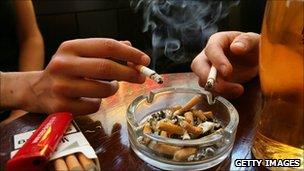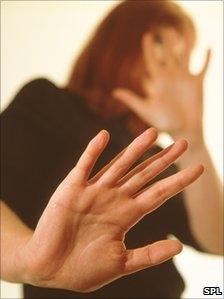Highlands and Islands' battle with the bottle
- Published

Dr Somerville said smoking and alcohol were among risky behaviours
The strain of alcohol abuse on public services in the Highlands and Islands is being highlighted by health professionals and the police.
NHS Highland's director of public health has said alcohol-related problems in the region are far worse than she had expected.
Dr Margaret Somerville has been in the job since February after moving to Scotland from England.
Following the release of her first annual report, she said alcohol, smoking and obesity were the three main risky behaviours that challenged local health services.
She told BBC Radio Scotland: "We have a particular concern with alcohol in Highland.
"We are not seeing alcohol consumption coming down despite a lot of work."
Dr Somerville added: "Alcohol is clearly part and parcel of Scottish culture.
"We are not here to say to people they shouldn't drink at all, but it is to say be aware of how much you drink and encourage responsible, safe drinking."
She said staff were dealing with liver complaints and nerve and brain damage as well as victims of drink-fuelled violence.
Alcohol abuse also challenges policing in the Highlands and Islands.
Northern Constabulary's public performance reports record a rise in incidents of drunkenness.
In 2005-06 there were 729 incidents, 873 in 2006-07, 866 in 2007-08 and 914 in 2008-09.

Alcohol is a feature of domestic violence, police say
Chief Constable Ian Latimer's most recent report on crime figures for the force area, external give an insight into the dark side of boozing.
In Shetland - one of Northern's command areas but not part of NHS Highland - he reported that violent crime had increased since 2009.
Mr Latimer said detection rates were high, at 95%, but noted crimes were happening in private homes away from the public gaze.
He said: "This is an early indication that the pattern of drinking within the populous is moving from drinking within licensed premises to drinking/partying within the home and may be linked to the increase in noise calls from domestic dwellings."
Targeting pubs and clubs in an effort to curb street violence saw 27 fewer victims of drink-related crime in Orkney during September this year, the senior officer said.
However, 13 out of 23 reports alleging domestic abuse between 1 July and 30 September on the islands were found to involve alcohol.
In Caithness, Sutherland and Easter Ross, Mr Latimer said visible policing outside pubs and clubs was believed to have led to a "marked downturn" in street violence.
His report also outlined operations to tackle underage drinking in Lochaber and said the abuse of alcohol among young people on the Western Isles was "problematic".
Another command area - Inverness, Badenoch, Strathspey and Nairn - had experienced an increase in incidents of drunkenness between April and September this year.
There were 236 cases, 47 more offences for the same time in 2009. The rise has been attributed to pro-active work by police officers.
Booze has been an age-old problem for police and health professionals in the Highlands and Islands.
Hugh MacKay was a police officer working in the Highlands and Islands from 1963 to 1998.
He told the BBC Scotland News website: "It was apparent to me right through my service that drink was the substance that caused most of the criminal conduct in society - particularly the disorderly behaviour and violence aspect of it."
The former superintendent added: "We would monitor the people we were arresting and noted whether or not they had been drinking.
"Quiet consistently 90% had been."
- Published30 November 2010